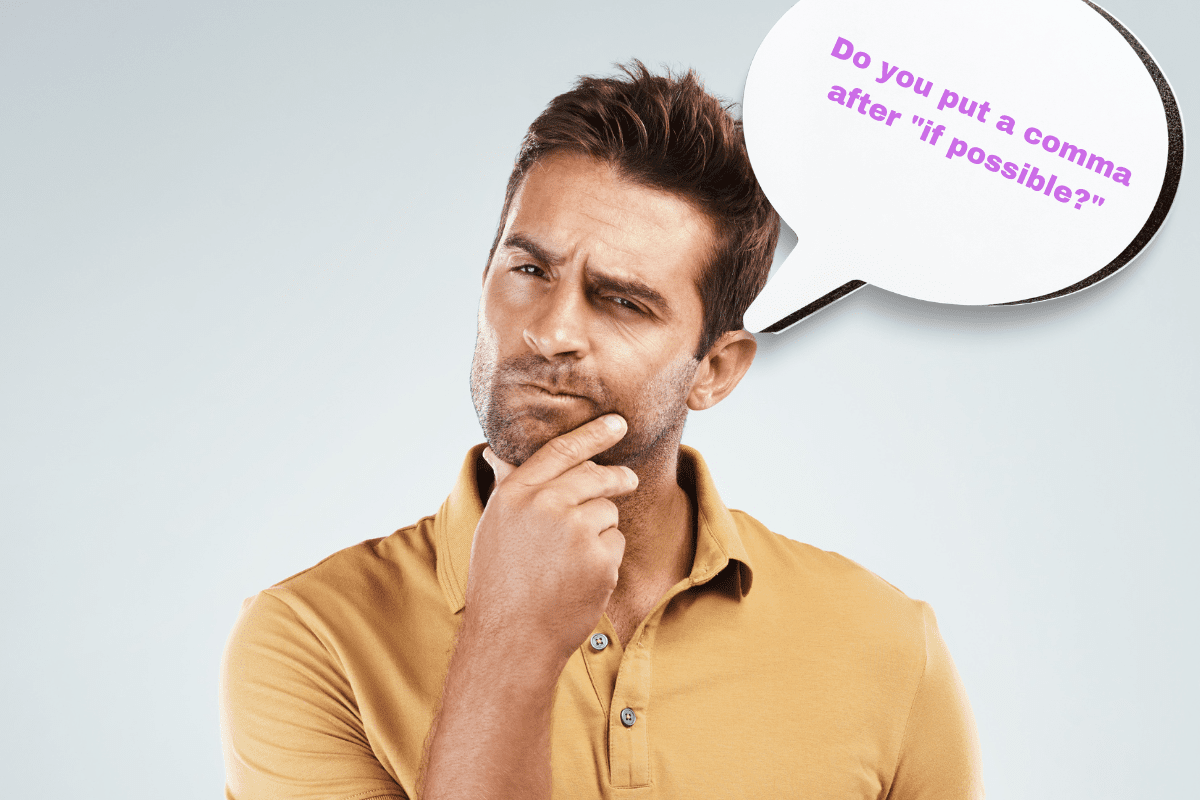Stumped on when to use a comma after “if possible”?
Same.
Different scenarios require different comma usage around this phrase, and it can be tricky to understand all the rules.
This article explains which situations do and don’t need a comma after “if possible”. Plus, get insight on when a comma should come before “if possible” — and if both are necessary.
Read through and become an expert in punctuating “if possible!”
Table of Contents
Using a Comma After “if Possible”

“If possible” is one of those vague little phrases that can be used in almost any context. Generally, it means something roughly along the lines of “if it can be done” or “if it’s at all feasible.”
Knowing when to use a comma after “if possible” requires some quality grammar detective work.
A comma should be placed after “if possible” if what follows is an independent clause. Without the comma, the two clauses would be grammatically joined and make for an awkward reading (and even more awkward writing).
Example: I will get it done as soon as I can, if possible.
In this example, you can see why the comma is necessary to separate the clauses and give them more emphasis.
Do You Need a Comma After “if Possible” at Beginning of a Sentence?

When it comes to the proper use of commas, many people are unsure about the rules for punctuating the beginning of a sentence.
Generally, you do not typically need to place a comma after an introductory phrase unless the phrase is a parenthetical element.
So, what qualifies as a parenthetical element? Good question!
Essentially, it is any extra information that could easily be removed from the sentence without changing its structure or meaning. “If possible” can be considered parenthetical if there are words or phrases needing clarification or emphasis to complete the sentence.
Example: “If possible, I want to go shopping today.”
This phrase requires a comma after “if possible.”
Example: “If you can help me out that would be great.”
This phrase doesn’t require a comma.
The art of punctuation may seem daunting at first but with practice and patience, it can be mastered!
When Not to Use a Comma After “If Possible”

Using a comma after “if possible” is not always required, depending on how the phrase is used. For example, when using “if possible” in the middle of a sentence to introduce an additional thought or detail that can be carried out if it is feasible, there is no need for a comma.
Consider the difference between saying “I will attend the meeting if possible” versus “I will attend the meeting, if possible”.
In this case, since there is not an introductory phrase before the clause beginning with “if possible,” only one comma should be included immediately after the word “meeting.”
Similarly, when used to express hope or desire at the end of a sentence, no comma should be inserted before or after the phrase.
Example: “Let’s make XYZ happen if possible.”
Instead, the phrase should appear as part of a complete unit while still being separated from prior and subsequent sentences by appropriate punctuation.
Understanding when to use and omit commas after “if possible” can help avoid awkwardness in your writing.
Do You Put a Comma Before and After “if Possible”?

Ever been unsure about when to include a comma before and after “if possible”? Don’t worry, you’re not alone.
In certain cases, commas should go around “if possible”.
That’s because this phrase can be a conjunctive adverb or linking element — both of which demand commas.
For instance, if it appears at the beginning of a sentence, there should be a comma after it — that way it won’t disrupt the flow of your writing.
If it sits between two independent clauses, then both commas come into play.
Finally, when “if possible” is used as an introductory clause or phrase, don’t forget: two commas!
However, there are some cases in which it may not be necessary to include commas with “if possible”.
For instance, if “if possible” appears at the end of a sentence or phrase and does not separate two independent clauses (e.g., We will try our best if possible), then no commas would be required. Here are some examples demonstrating correct usage:
We will attend the meeting tomorrow if possible.
If possible we will try to complete the project on time.
Let’s do our best if possible to meet our deadline.
When Do You Use a Comma Before if Possible?

It’s important to understand when commas should and shouldn’t be used before and after “if possible”.
Generally speaking, a comma is not required before or after if possible.
However, there are certain situations in which both commas should be used.
For instance, when “if possible” appears at the beginning of a sentence, it should have a comma after it.
This is because “if possible” functions as a parenthetical element in this context and would otherwise disrupt the flow of the sentence.
Similarly, if “if possible” is used between two independent clauses, then it should also have both commas around it.
In addition to these cases, when “if possible” is used as an introductory phrase or clause, both commas should be included. Here are some examples that illustrate correct usage:
If possible, we will attend the meeting tomorrow.
We will attend the meeting tomorrow, if possible.
We will try to do our best — if possible — to complete the project on time.
When Do You Not Use a Comma Before if Possible?

Although a comma should be used before “if possible” in certain circumstances, there are some cases in which no comma is necessary.
This is because if “if possible” does not separate two independent clauses (e.g., We will try our best if possible), then no commas would be required.
Additionally, even when “if possible” appears at the beginning of a sentence, it may not need to have a preceding comma if it follows another introductory element (e.g., After lunch, if possible).
Therefore, it is important to pay attention to the context and function of “if possible” within the sentence or phrase to determine whether to include a comma. Here are some examples demonstrating correct usage:
Let’s do our best if possible to meet our deadline.
After lunch, if possible we can go for a walk.
We will attend the meeting tomorrow if possible.
Conclusion

Trying to decide if you should use a comma before “if possible” can get complicated. Understanding the context and function of the phrase is key.
If it’s used between two independent clauses, commas are essential (e.g., She will make lunch while he cleans up, if possible).
But when it follows an introductory element (e.g., After lunch, if possible) or does not separate two independent clauses (e.g., We will try our best if possible), no comma is needed.
It’s important to remember that proper grammar always comes first, however sometimes omitting a comma will lend your writing a more informal and conversational tone!

